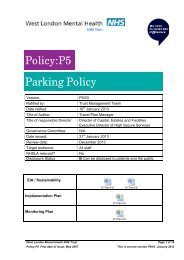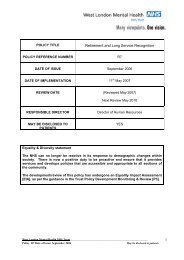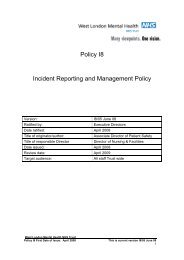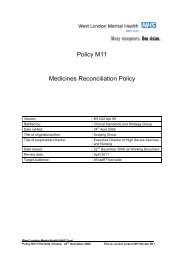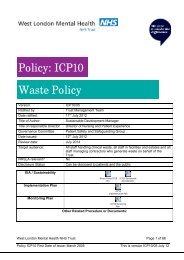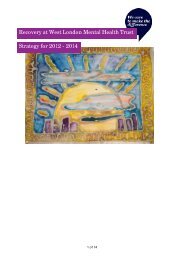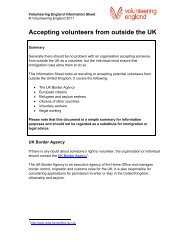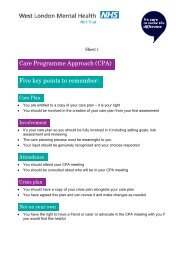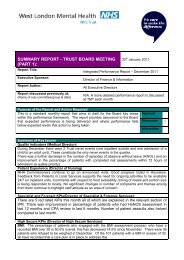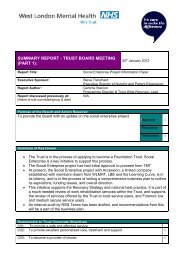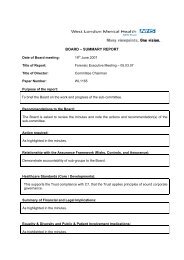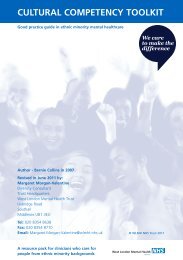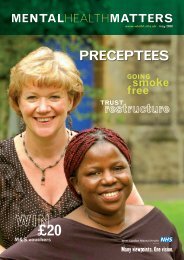Annual report 2012-13 - West London Mental Health NHS Trust
Annual report 2012-13 - West London Mental Health NHS Trust
Annual report 2012-13 - West London Mental Health NHS Trust
Create successful ePaper yourself
Turn your PDF publications into a flip-book with our unique Google optimized e-Paper software.
Governance statement <strong>2012</strong>/<strong>13</strong>from the chief executive1. Scope of responsibilityAs accountable officer, and chief executive ofthis board, I have responsibility for maintaining asound system of internal control that supports theachievement of the organisation’s policies, aims andobjectives whilst safeguarding the public funds andthe organisation’s assets for which I am personallyresponsible, in accordance with the requirements setout in the accountable officer memorandum.I am accountable to the chairman of <strong>West</strong> <strong>London</strong><strong>Mental</strong> <strong>Health</strong> <strong>Trust</strong> for my performance. I am alsoaccountable to <strong>NHS</strong> <strong>London</strong> for the performanceof the trust. I work in partnership with PCTs /CCGs, local authorities and the police, throughlocal partnership boards and agreements, todeliver objectives that cut across organisationalboundaries. There are also separate performancereviews with <strong>NHS</strong> <strong>London</strong> for the services providedby the high secure hospital, Broadmoor.As chief executive, I have overall responsibility forhaving effective risk management arrangementsin place. As accountable officer I have delegatedthe following lead responsibilities to otherexecutive directors:• Director of nursing & patient experience -responsibility for infection control, liaison withthe Care Quality Commission, patient safety,patient experience, risk management and theboard assurance framework.• Medical director - overall responsibility forclinical effectiveness, medicines managementand safeguarding.• Director of finance / deputy chief executive -responsibility for financial and business risk.• Clinical service unit (CSU) directors areresponsible for ensuring significant risks areidentified, assessed, and effectively controlledwithin their area of responsibility.2. Governance frameworkThe trust’s governance framework is designed tomanage and mitigate risk to a reasonable levelrather than to eliminate all risk of failure to achievepolicies, aims and objectives; it can therefore onlyprovide reasonable and not absolute assurance ofeffectiveness. Governance and internal control ofthe organisation is an ongoing process designed to:• identify and prioritise the risks to the achievementof the organisation’s policies, aims and objectives,• evaluate the likelihood of those risks being realisedand their impact, should they be realised, and• manage and mitigate risk efficiently, effectivelyand economically.The system of internal control has been in place in<strong>West</strong> <strong>London</strong> <strong>Mental</strong> <strong>Health</strong> <strong>NHS</strong> <strong>Trust</strong> throughoutthe year ended 31 March 20<strong>13</strong> and up to the dateof approval of the annual <strong>report</strong> and accounts.The board is compliant with the corporategovernance code and continues to make goodprogress with its application to become a foundationtrust. Further reviews of the governance frameworkhave taken place especially in relation to qualitygovernance and this was reviewed by externalassessors (Ernst & Young) and an action plandeveloped to address the issues raised, whichincluded strengthening our quality strategy bymaking objectives more measurable, improving andstreamlining the performance and quality metrics<strong>report</strong>ed to the board and ensuring consistent qualitygovernance arrangements across the trust’s CSUs.Other areas of governance have also been subjectedto external review including financial governanceand the effectiveness of the board. The board hasnow instigated a process of continuous improvementin relation to governance arrangements taking intoaccount the lessons learnt from other applicant trustsand external experts. The board is supported in itsjourney by a comprehensive board developmentprogramme which is informed both by individualand collective appraisals of board members and thefeedback from the various experts. The trust, thestrategic health authority and the Department of<strong>Health</strong> have a tripartite formal agreement, settingout key milestones to be achieved on the FT journey,against which they formally monitor our progress.From 1 April 20<strong>13</strong>, the trust’s progress with bemonitored by the <strong>NHS</strong> <strong>Trust</strong> Development Authority.Supporting committee structureTo support the board in carrying out its dutieseffectively, sub-committees <strong>report</strong>ing to it havebeen formally established. Their remits and termsof reference were reviewed during the year toensure robust governance and assurance. Eachreceives a set of regular <strong>report</strong>s as outlined in itsterms of reference and provides summary <strong>report</strong>sto the trust board after each meeting.The main sub-committees are as follows:Audit committee - reviews the establishment andmaintenance of an effective system of integratedgovernance, risk management and internal controlacross the whole of the trust’s activities. Gainsassurance that effective systems of internal controlare in place and monitors the integrity of the trust’sfinancial information.Quality committee - discusses evidence of clinicalgovernance and risk management within the trust.It provides strategic leadership for the developmentof continuous quality improvement, based on userexperience and feedback from stakeholders. Itscrutinises the risk register, approves and monitorsthe risk management processes and providesassurance on these processes to the audit committee.It approves and monitors the implementation ofclinical governance delivery plans.Finance & investment committee - ensuresthat processes governing strategic investments arebeing followed, and makes recommendations tothe board. This includes major capital or revenueexpenditure, the purchase, sale or alteration ofproperty (above an agreed threshold) and serviceexpansion or major service change, in addition toinformation governance.Attendance at board & sub committees <strong>2012</strong>/<strong>13</strong>During the year all board and sub committeemeetings have been quorate, except the trustboard meeting in December <strong>2012</strong>, where businesswas conducted with due regard to that fact.CommitteeAverage attendanceof members<strong>Trust</strong> board 82%Audit committee 75%Quality committee 67%Finance & investmentcommittee 80%The quality committee attendance figures wereimpacted in year by the long term absence, due toill health, of one member.In addition to the above, key, sub-committees forgovernance and assurance, the board is supportedby the:• Remuneration & nominations committee• Charitable funds committee• <strong>Mental</strong> health act managers’ committee• Service users’ & carers’ forumAlso, three programme boards, the staffengagement forum and the trust managementteam <strong>report</strong> into the trust board.44 <strong>Annual</strong> Report <strong>2012</strong>/20<strong>13</strong>45



